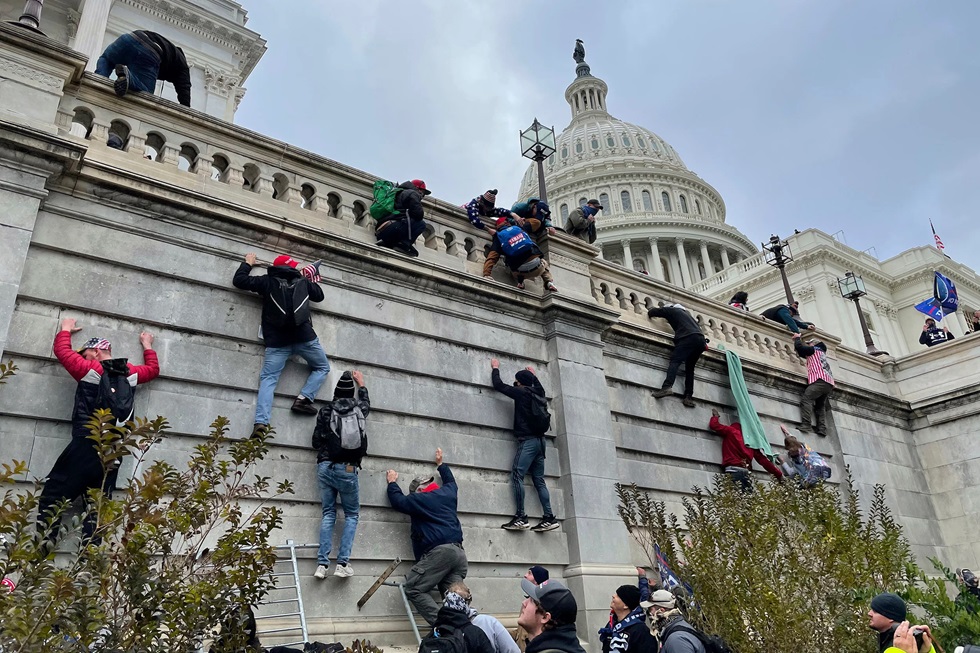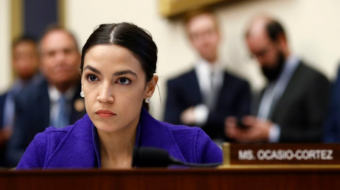
WASHINGTON—The right-wing MAGA majority on the Supreme Court is aiming to rule that ex-presidents have at least some degree of immunity from prosecution for crimes they commit. Perhaps more important even than the words of any such ruling, however, is that it would likely further delay the proceedings against Trump on charges that he plotted to subvert and reverse the results of the 2020 election.
Based on what transpired at the Court yesterday, it seems that they also will send the case back to the trial court, ordering it to draw distinctions between private and official conduct. Essentially, if the right-wing justices prevail, a crime that is deemed as a part of an “official” act will be perfectly OK.
The judges seemed to agree that the trial could, after all that is settled, go forward based on Trump’s alleged “private” crimes. That, however, is far from enough to prevent delay of the case until well after the election. The right-wing judges, in disagreement with the prosecution, showed no sense of urgency about the timing of the case, however. The right of the American people to a speedy trial and one that informs them about matters crucial to their choice in the coming election was of no concern to the right-wing justices. Their focus is almost entirely on the right of the criminal defendant, Trump, to be granted privileges no other person would get in the U.S. justice system.
Justice Neil Gorsuch, one of the right wingers, defended the pro-Trump approach and the delay by saying, “We’re writing a rule for the ages.” It indeed will be a rule that presidents can claim when they grab dictatorial powers when they see fit. They just have to make sure that all their crimes fall under the category of “official acts.” The worst crimes of the Nazis in the last century, it should be noted, were “official acts” of the fascist state. A president could theoretically run a massive criminal enterprise out of the Oval Office and not have to worry about prosecution.
Should a president really be above the law, now and forever? That, of course, is what Donald Trump wants.
And the Supreme Court grappled with his demand—which would turn the presidency into a dictatorship—on April 25, as Trump proclaimed he should have absolute immunity forever from criminal prosecution, strictly because he’s a former president of the United States.
Trump’s demand left his lawyer, J. Michael Sauer, and Justice Department attorney Michael Dreeben to argue the most politically and constitutionally significant case in a quarter of a century, if not longer.
Trump’s “novel theory would immunize former presidents from criminal liability for bribery, treason, sedition, murder, and, here, conspiring to use fraud to overturn the results of an election and perpetuate himself in power,” Justice Department attorney Dreeben opened.
Appealing to the court’s “originalists”—who make up most of the five Justice right-wing Supreme Court majority—Dreeben declared “Such presidential immunity has no foundation in the Constitution.”
Sauer said a president, while serving in the Oval Office, enjoys immunity from criminal prosecution forever thanks to a 1999 Justice Department memo. He declared the only way to get at a criminal president during his term is impeachment and conviction. Then the president can be tried criminally.
The catch is that the same memo says once the occupant exits the presidency, criminal prosecution is available. Which is, of course, what lower courts have already ruled in the Trump immunity case.
Both attorneys said immunity within a president’s term covers official actions, not political ones. But Sauer contended that “official” covers far more than the Justice Department says it does. And that’s the reason the whole mess is at the High Court in the first place.
Countering that stand, Dreeben told Chief Justice John Roberts “there is no immunity” beyond the presidential term “unless this court creates it today.”
The immunity case is important for both constitutional and political reasons, and it’s important to workers, too.
Took on a hot potato
The constitutional reason is the justices, in taking the case, took on the hot potato of deciding whether a president, any president, is so exalted and has so much responsibility that he or she should be exempt from the maxim “no person is above the law.”
“You seem to be worried about the president being chilled” in carrying out his duties, Justice Ketanji Brown Jackson told Trump’s attorney, Sauer. “I think that we would have a really significant opposite problem if the president wasn’t chilled.
“If someone with those kinds of powers, the most powerful person in the world with the greatest amount of authority, could go into office knowing that there would be no potential penalty for committing crimes, I’m trying to understand what the disincentive is from turning the Oval Office into, you know, the—the—the—the seat of criminal activity in this country.
“If there’s no threat of criminal prosecution” of the president “what’s to prevent him from doing what he wants?”
The political reason is Trump needs a win from the Supreme Court to clear away two of the four large court cases hanging over his head, one each in federal courts in D.C. and West Palm Beach, Fla. Trump’s attorneys have successfully stalled both pending the justices’ ruling.
And the importance to workers is the court’s ruling will help determine whether Trump is politically viable in this year’s presidential race. Though he’s the Republican nominee, half of Republicans would desert him if he’s a convicted criminal.
And if Trump isn’t convicted, and he defeats Democrat Joe Biden in their second straight faceoff—the two are tied though Trump is declining in the polls—Trump has drastic plans to curb civil rights, constitutional rights, and workers’ rights.
Trump plans on being “a dictator on day one” and nobody expects him to stop then. His plans would include nullifying constitutional sections he doesn’t like, sending troops into the streets against opponents, and cracking down on workers and unions. Trump tried that crackdown in his first term, against federal workers. His aides wanted to extend it to all.
Trump seeks perpetual immunity from criminal prosecution in D.C. on charges of depriving citizens of their right to have their votes counted and reported honestly, and of fraud on the government for doing so. He also faces two other counts.
The delayed D.C. federal case arises out of Trump’s role in virtually ordering the Trumpites’ Jan. 6, 2021 invasion, insurrection, and attempted coup d’etat at the U.S. Capitol, all to keep their god in office after he lost the prior election to Democrat Joe Biden.
The second federal trial, in West Palm Beach, Fla., covers Trump’s purloined papers, taken from the White House to his estate at Mar-a-Lago. They include top secret documents, such as a Pentagon plan to make war on Iran and the number of nuclear missiles on U.S. submarines.
“The Framers knew too well the dangers of a king who could do no wrong,” referring to England’s George III, who fancied himself an absolute monarch, despite parliamentary checks, Dreeben told the court. “They therefore devised a system to check abuses of power, especially the use of official power for private gain.
In this case, the Justice Department “is enforcing congressional statutes and seeking accountability for petitioner’s [Trump’s) alleged misuse of official power to subvert democracy. That is a compelling public interest.”
Says he could not function
Sauer declared that Trump, again the Republican presidential nominee this year, could not function in the presidency without immunity for any crime committed at all, even in extreme cases.
“Isn’t that the nature of the allegations here, that he’s not doing these acts in furtherance of an official responsibility; he’s doing it for personal gain?” Justice Sonia Sotomayor asked Sauer.
Trump’s attorney Sauer twisted himself in knots trying to answer the justice: “I agree with that characterization. That confirms immunity because the characterization is that there’s a series of official acts that were done for an unlawful and improper purpose.”
But “immunity says, even if you did it for personal gain, we won’t hold you responsible,” Justice Sotomayor countered. “The founders” who wrote the U.S. Constitution “talked about immunity, but instead they wrote impeachment” into the nation’s basic document.
“You’re trying to get us to give that president”—any president, not just Trump—”absolute immunity.”
Justice Elena Kagan ran through a list of Trump’s attempts to void the election results four years ago, asking if they were all “official actions” deserving immunity even after Trump left the White House. She topped the list by citing the insurrection. Trump attorney Sauer’s answer to each was some variation of “yes.”
Would Sauer give some ground in extreme cases, such as “if a president orders the military to stage a coup?” Justice Kagan asked.
“There’s a whole series of, you know, sort of guidelines against that, so to speak, like the UCMJ [Universal Code of Military Justice],” Sauer replied. The code, he said “prohibits the military from following a plainly unlawful act.”
The Supreme Court’s decision, due by June 30, does not affect two state court cases involving Trump.
One is underway in New York. That hush money/cover-up trial pinned Trump in a Manhattan courtroom—listening to revelations of his misogyny, campaign finance law-breaking, and more even as his lawyers argued in D.C. Trump lawyers’ maneuvers have delayed the other, in Atlanta. Fulton County DA Fani Willis charges Trump and others with racketeering and conspiracy to steal swing state Georgia’s electoral votes four years ago.
Dreeben admitted to Justice Samuel Alito that if a president got advice from an Attorney General that a particular action was legal, the president could go ahead with it—and use that advice as a defense. Then Dreeben tried to backtrack. Justice Alito jumped on him.
“Won’t that give presidents an incentive to be sure to pick an Attorney General who will reliably tell the president that it is lawful to do whatever the president wants to do if there’s any possibly conceivable argument in favor of it?” the justice asked.
“I think the constitutional structure protects against that risk. The president nominates the Attorney General and the Senate provides advice and consent,” Dreeben replied. Unmentioned: Except in extreme cases, the Senate routinely approves presidential Cabinet members. The Senate historian’s office reports the last time senators rejected an Attorney General nominee was 1925.
We hope you appreciated this article. At People’s World, we believe news and information should be free and accessible to all, but we need your help. Our journalism is free of corporate influence and paywalls because we are totally reader-supported. Only you, our readers and supporters, make this possible. If you enjoy reading People’s World and the stories we bring you, please support our work by donating or becoming a monthly sustainer today. Thank you!













Comments